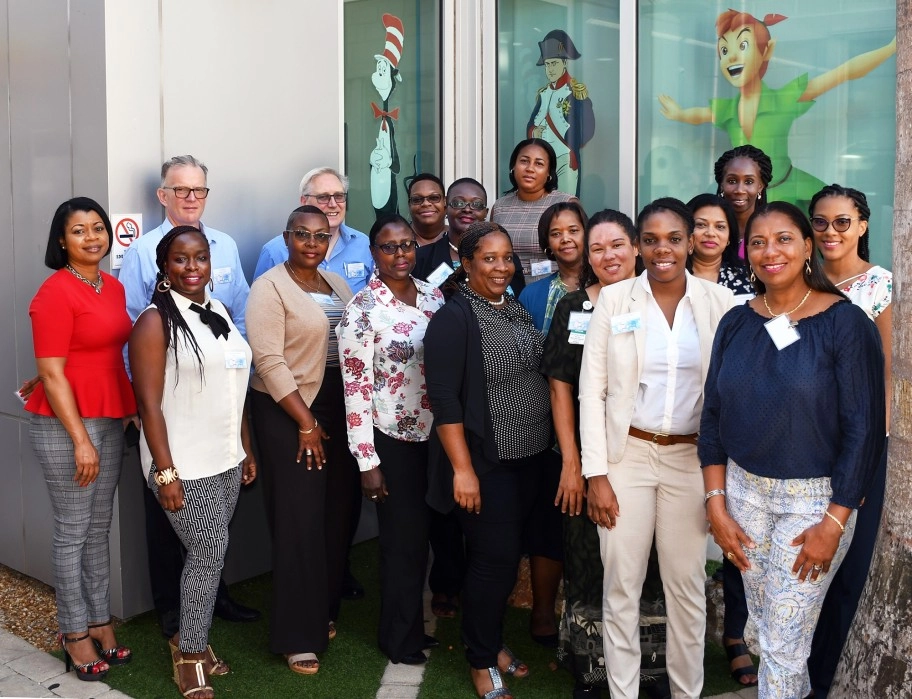CIPS, Royal Mail Host Training for Regional Postal Staff
CIPS, Royal Mail Host Training for Regional Postal Staff
Key postal personnel from nine regional jurisdictions participated in a week-long workshop from Monday, 12 to Friday, 16 August 2019 at the historic old Public Library building in George Town, Grand Cayman to better prepare for changes in postal accounting systems.
The Terminal Dues and Cost Accounting Training workshop was jointly hosted by the Cayman Islands Postal Service (CIPS) and the Royal Mail Group, the designated postal operator in the UK.
The workshop was organised for regional postal operators to gain expertise in complex postal accounting systems. Participants were Postmasters General or deputies and assistants or senior postal financial officers from Anguilla, Bermuda, British Virgin Islands, Guyana, Jamaica, Montserrat, Trinidad and Tobago, and Turks and Caicos Islands, in addition to officers from the CIPS, led by Postmaster General Sheena Glasgow. Royal Mail Group’s expert, Dr Thomas Ryall, conducted the workshop.
Explaining the need for the workshop, Postmaster General Ms Glasgow said that by using the enhanced systems, postal services that are at the destination end of posted mail will be able to collect revenue for international mail, closer to their actual cost of delivery.
Postal operators at the post office of origin, where the packages, parcels or letters are posted, collect postage revenue from customers in the form of postage. These postal entities, in turn, pay the postal operator in other jurisdictions that handle the mail along the way, including the final destination of the intended mail.
Terminal Dues is a postal accounting system that allows the destination post to get paid for delivery. Postmaster General, noted: “People generally say that the Post Office is dying because nobody sends mail anymore. This is not true, but the nature of business has certainly changed. There is a marked decline in documents mail volumes due to today’s internet and electronic substitutions.
“At the same time, there has been an increase in mail items containing goods which have been ordered via the internet; this is the new nature of the business of the Post Office worldwide. Increased movement of packages and parcels, brought about by burgeoning global internet sales and customer demand for low-cost, high-visibility shipping solutions is an example of the increasing complexity in the costing and collection of handling fees for postal services.”
The organisers said United States President Donald Trump has raised issues of remuneration for low weight, mail items containing goods, as well as threatened to withdraw the United States from the Universal Postal Union if these matters are not addressed. It has therefore become imperative that Caribbean posts be able to analyse the impact that remuneration proposals will have on their operations such as their costs and prices.
Royal Mail Group’s trainer Dr Ryall explained further: “The Postal operators and their Governments recognise the power and opportunities that ecommerce represents, we have seen the explosion of opportunities in Europe, Asia and North America and this region has made it one of its key priorities to ensure they too have the knowledge and resources, not only to operate in this sector, but also to thrive.
“We are collectively now addressing the building blocks to ensure we have a successful business model for the regions’ Posts. We have seen the Cayman Islands, Guyana and others implement electronic customs solutions that enhance border protection whilst streamlining processes, improving customer experience. We have seen bespoke freight services launched in the BVI and Anguilla that sets beside the traditional mail services offering greater consumer choice.”
The workshop provided Postal Operators from across the region a chance to enhance their ability to provide sustainable, efficient and affordable postal services and to ensure that Posts can profitably address the needs of the ecommerce market and facilitate cross border trade, Dr Ryall stated.
He continued, “The sessions this week also aimed to enable Posts to ensure they have the right accounting structures in place for cross border mails and that Posts can effectively price services so that they and their stakeholders can ensure a successful, sustainable future. We need not only to equip ourselves with the knowledge but we also need the support of stakeholders, especially our Governments, to ensure we can realise the change we and our customers need.
“The workshop shared knowledge about the possible development of the pricing structure for the delivery of international mail and the challenges posed from possible outcomes of the Trump memorandum on international postal services that may damage the UPU global network.”
Dr Ryall added, “Change of this scale presents many challenges to individual posts, but we recognise that by working, as a community we can help each other to grow. We also need inspiration, so I would like to thank both the Cayman Islands Post and the Government of the Cayman Islands for showing strong leadership and a vision for the future which will guide us this week.”
The workshop itself involved minimal expenses for the Cayman Islands since the participants paid for their stay and expenses during the week.
Latest News
-
RCIPS Warns of Malicious PDF Email Targeting Local EntitiesPolice/Cou...19 February 2026, 03:42 PM
-
Missing: Armani McLeanPolice/Cou...19 February 2026, 04:59 AM
-
Missing: Latoya SeniorPolice/Cou...19 February 2026, 04:58 AM
-
Cayman Airways Adds Extra Panama Flights for EasterTourism19 February 2026, 04:57 AM
-
Applications Open for CICBD's Business Growth Incubator ProgrammeBusiness19 February 2026, 04:53 AM


